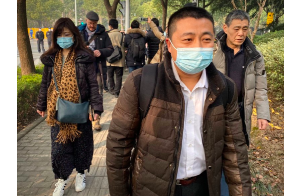Fantastic to see NPR cover the subject – and unsurprisingly it’s a great piece too.
For most of the last decade, lawyer Ren Quanniu made a name for himself in China representing members of the outlawed religious philosophical group Falun Gong — politically sensitive cases other attorneys would not touch.
In January, he was tasked with perhaps his hardest case of all: defending himself against disbarment. He ultimately failed.
Ren is the second lawyer to be disbarred after attempting to represent one of 12 people who tried to escape Hong Kong after the introduction of a repressive new national security law. They were caught by the Chinese coast guard and later tried for illegally crossing a Chinese border by a court in mainland China. They also face other criminal charges related to their participation in mass protests that rocked Hong Kong in 2019.
“Even if my lawyer’s license is canceled, I have at least made good use of it,” Ren said in an interview from his office in Henan province, shortly before he was disbarred. “Lawyers should be advocating for society’s most vulnerable.”
Ren is the latest among prominent rights lawyers in China to have been either threatened with disbarment, or disbarred, after taking on politically sensitive cases, or those which challenge the state’s interests. Once a vibrant and growing profession, China’s rights lawyers have been buffeted by a wave of political restrictions under President Xi Jinping, who has placed Communist Party rule above rule of law.
Lawyers say justice officials have also been blocking them from meeting clients, who have the right to legal representation in China.
The restrictions stem from a 2015 campaign that jailed or disqualified more than 200 of the country’s most aggressive, civically minded legal advocates.
China still arrests and imprisons lawyers for their political advocacy. But now the state has increasingly relied on suspending or permanently revoking their licenses as a less attention-grabbing — and less draconian — punishment to dissuade them from taking on politically contentious cases.
Ren’s downfall
Originally trained as a singer, Ren began his legal education after he sensed the profession promised a path out of his village in impoverished Henan province. Law was an attractive candidate because, “I had seen some movies with lawyers in them, and they seemed cool,” says Ren. “A person needs a skill, something they are good at.”
He worked odd jobs to pay his way through school. His first two attempts at the bar exam failed, because his side jobs left him no time to study. He succeeded the third time, in 2007.
Ren quickly took on urban demolition cases and rural property disputes that were common in the mid-2000s as a building boom relocated millions of residents. He eventually specialized in religious freedom cases, quietly writing legal briefs for dozens of Falun Gong adherents and Christians.
Last year, he tried to represent Zhang Zhan, a blogger who was sentenced to four years in prison for filming and posting online videos documenting desperate scenes from the early days of Wuhan’s COVID-19 lockdown. Ren was removed from the case after Zhang was provided a state-appointed lawyer.

Lawyers Ren Quanniu (left) and Zhang Keke representing Chinese citizen journalist Zhang Zhan, who reported on Wuhan’s coronavirus outbreak and was detained in May, during an interview with Agence France-Presse on Dec. 27 in Shanghai ahead of their client’s trial.
Leo Ramirez/AFP via Getty Images
Ren was also unable to meet with Wong Wai-yin, one of the 12 Hong Kongers who tried to flee by boat to Taiwan last year. The attorney says he had Wong’s family state in a video, and in a written letter, that Ren was Wong’s personal lawyer. But Shenzhen prison guards barred Ren from speaking to Wong, saying he couldn’t prove the detainee had hired him. Later, they said Wong had hired another lawyer.
In both Zhang Zhan and Wong Wai-yin’s cases, Ren was never able to actually represent his clients — but he believes he was disbarred for simply trying to do so.
“I received several calls from national security officers. They said they had high-level orders from Beijing that I had to drop this Hong Kong case or my lawyer’s license might be affected,” says Ren. He thought they were bluffing.
In December 2020, Wong was sentenced to seven months in prison for immigration violations. Less than a week later, Ren received a notice from his provincial justice department notifying him he faced disbarment because of written comments he had made during a 2018 Falun Gong case. Ren disputes the charge, because the comments in question were part of standard briefs he submitted to the court.
Fellow lawyer Lu Siwei also lost his license in January after trying to represent one of the 12 Hong Kong escapees. China’s justice departments do not divulge disbarment statistics, but Lu is the fourth prominent lawyer to lose his license last month alone.
“They choke you off”

Pro-democracy activists hold placards in support of 12 Hong Kong residents detained in mainland China and former lawyer Zhang Zhan outside the Liaison Office of the Central People’s Government on Dec. 28 in Hong Kong. They protested as Zhang and the 12 residents were due in court in Shenzhen, China.
Anthony Kwan/Getty Images
To disbar lawyers, authorities are using 2016 rules banning them from engaging in outspoken behavior outside the courtroom. Lawyers are often their clients’ most vocal advocates online and in media interviews.
“They choke you off, step by step, without having to finish you off themselves,” says Liu Xiaoyuan, a former partner at the now defunct Fengrui law firm in Beijing. Liu and his firm took on high-profile cases, including the artist Ai Weiwei and Uighur academic Ilham Tohti. His license was revoked in 2019 after nearly four years of legal proceedings prevented him from taking on new cases.
Read more





